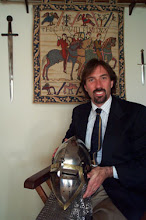Iron Clad Chivalry
I got to see the new movie Iron Man this weekend. It's a fun show - and, in many ways, just another example (in my opinion) of how some of the best storytelling venues these days are packaged as "kid's stuff." (Although this - like a lot of the recent comic-book hero movies - isn't really appropriate for young children.)
Apart from the usual themes of adventure and the hero's journey, Iron Man did bring one interesting element to the screen: It highlighted the fact that a hero has to have a greater purpose beyond merely making war.
In some ways, the movie's protagonist was reminiscent of a medieval knight in the fact that "he never met a war he didn't like." From the writings of the period, it's clear that many knights of the 12th, 13th and 14th centuries saw battle as a noble cause in its own right, and romanticized the practice of warfare. While the doctrine of "just war" had been established in the 11th century, the concept had yet to be fully realized by warriors and rulers of the period - and much damage (physical, social, economic) was done due to the aristocracy's eagerness to go to war as proof of their dominance, or virility, or (ironically) piety. The Crusades, the Hundred Years War, the Wars of the Roses ... etc.
While Iron Man was certainly full of FX and comic book violence (exactly how did that millimeter-thin suit protect Tony Stark from 20mm cannons, missile explosions and hitting the ground at mach 2?), it did present an intriguing message about the fact that it takes more than violence to make someone a knight in shining armor - or a hero in a gold and red suit.
Labels: comic book, Crusades, Hundred Years War, Iron Man, knight, marvel


0 Comments:
Post a Comment
Subscribe to Post Comments [Atom]
<< Home